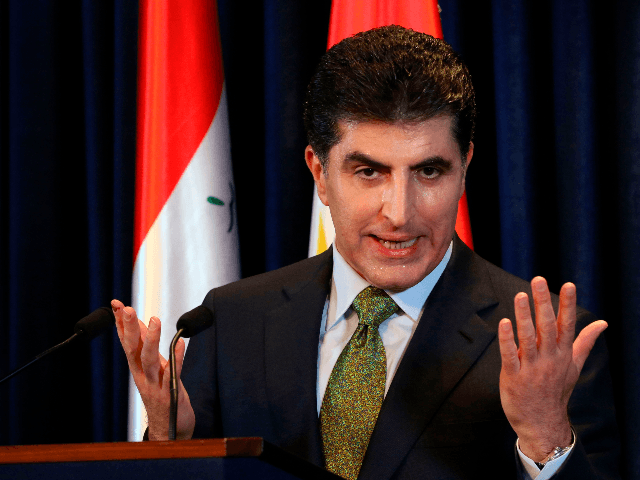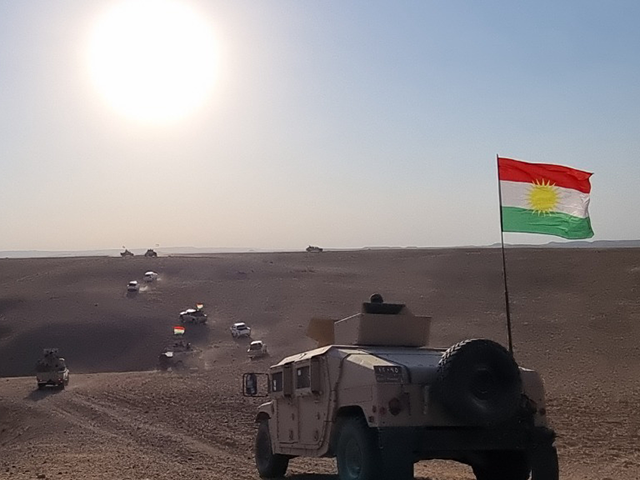President Nechirvan Barzani, who presides over the Kurdistan Regional Government (KRG) of Iraq, warned in conversation with a German legislative delegation that the Islamic State remains a “serious threat” to the country, the KRG revealed in a press release on Wednesday.
Barzani was meeting with Nils Schmid, a German lawmaker of the Social Democratic Party, discussing ongoing ties to both Iraq and the semi-autonomous KRG. The KRG and its armed forces, the Peshmerga, were instrumental in the defeat of the Islamic State’s “caliphate” in Iraq, and particularly the liberation of Iraq’s second-largest city Mosul. The Islamic State’s “caliphate,” at its peak, stretched across large swathes of both Iraq and Syria.
The Islamic State also organized a multi-provincial assault targeting KRG areas in July, killing at least seven.
The Islamic State has largely fallen out of international concern following the death of its leader, Abu Bakr al-Baghdadi, during a U.S. military operation in 2019. The original territory of its “caliphate,” in particular, has largely fallen out of global headlines, while its cells in Afghanistan (ISIS-Khorasan Province) and Africa have become more prominent. Kurdish outlets in Iraq have documented a growing number of attacks in the country in the past few months, however, particularly in the greater area around the city of Kirkuk.

Nechirvan Barzani, Prime Minister of Iraq’s autonomous Kurdistan Regional Government (KRG), speaks during a press conference in Arbil, the capital of the Kurdish autonomous region in northern Iraq, on October 4, 2018. (SAFIN HAMED/AFP via Getty Images)
Kirkuk is a multiethnic and oil-rich city that fell into Kurdish hands when the Iraqi military fled an Islamic State assault. Baghdad seized the city in 2017 following a KRG referendum on seceding from Iraq meeting no Kurdish resistance, as the administration of then-President Donald Trump and most Western allies of the KRG refused to publicly support the referendum. While typically supportive of the KRG has a subordinate entity to Iraq, then-Secretary of State Rex Tillerson publicly derided the referendum as jeopardizing “a united, federal, democratic and prosperous Iraq.”
Kurdish leaders have for the past five years warned that the Iraqi military, which now boasts Iranian-backed militias as part of its armed forces, has failed to subdue ISIS in the region and the terrorists have taken advantage of power vacuums around the city where neither the Peshmerga nor Iraqi soldiers operate.
Adding to the potential chaos is Baghdad’s failure to form a functional government since October of last year. An ongoing political feud between Shiite factions loyal to Iran and those loyal to Iraqi cleric Moqtada al-Sadr, whose bloc swept the October elections, has resulted in Sadr calling for all his lawmakers to resign and demanding a new election, which Iraqi officials have denied. Sadr dramatically announced his resignation from politics in general last week in protest of the stalemate, which has resulted in no appointment of a new prime minister. In response, his supporters stormed Parliament, resulting in deadly street battles between his Shiite militia and some members of the Popular Mobilization Forces (PMF), Shiite militias mostly backed by Iran.
Barzani used the opportunity of meeting with the German officials this week to note that Erbil, the capital of the KRG, continues to consider the Islamic State a problem it needs international aid to fully eliminate.
“President Nechirvan Barzani stressed that ISIS in Iraq and Syria is still a real threat,” a KRG readout of the meeting with the German lawmakers relayed. “The President stated that Iraq and the Kurdistan Region continue to need international assistance to eradicate terrorism and expressed hope that the German parliament will decide on the extension of its troop deployment in the country in October this year.”
Barzani most recently issued a similar warning in July after four separate attacks in one night that month, reiterating that the Islamic State is “a real threat to the security and stability of Iraq that needs to be stood against seriously” and encouraging global attention to the issue. Kirkuk was among the regions hit with an ISIS attack.
The Peshmerga, who still operate near the border of Kirkuk, revealed the execution of an anti-Islamic State “clearing operation” near the province on Tuesday, providing little information other than that Kurdish forces had discovered an Islamic State hideout in the area and the operation to neutralize it lasted six hours.
The Iraqi government sent its chief of staff to Kirkuk on Thursday to follow up on concerns that its forces have failed to adequately secure the province from an Islamic State resurgence.
“The ISIS militants especially are active in the security vacuum created by Iraqi forces and Iranian-backed forces,” Kurdistan 24 explained, “by pushing out Peshmerga forces from the disputed territories after Kurdistan Region’s September 2017 independence referendum.”
Kirkuk lost tens, if not hundreds, of thousands of residents when Iraqi forces recaptured it in 2017. KRG sources complained that Iraq sent PMF militias in to secure it, as its own army was too weak, and many of these fighters looted and burned down homes, terrorizing the civilian populace.
Independent of Baghdad’s relationship with the Kurds, some reports have suggested that the Islamic State, which follows its violent interpretation of Sunni Islam, is attempting to use the feud between the pro-Iran PMF Shiites and the nationalist Sadrists to recruit and rebuild.
“Daesh [Islamic State] propaganda has been capitalizing on the recent intra-Shiite turmoil in Iraq to argue that Sunnis have nothing to gain from aligning themselves with squabbling Shiite political forces, and should instead give refuge to Daesh fighters as a bridgehead for regaining their ‘caliphate,'” the Saudi Arab News reported on Monday.
Arab News observed that Islamic State cells in Kirkuk and one other province, Diyala, were the only “consistently active” ones this year.

COMMENTS
Please let us know if you're having issues with commenting.